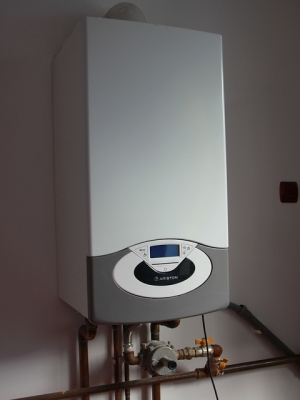Choose from These Different Boiler Types

Boilers are the most popular heating systems in the UK, and are often used to heat water for the home as well. Choosing the boiler that's right for your home and your needs is largely a matter of space and convenience, as well as price and installation costs. There are three different boiler types to choose from: Conventional boilers, combi boilers, and system boilers.
Conventional Boilers
These boilers are the most old-fashioned of the three different types of boilers. They consist of a hot water storage tank, a cold water cistern that sits in the loft above the boiler and an expansion cistern. Conventional boilers are ideal for larger homes with a high demand for hot water, as there is always hot water stored in a large tank. This allows you to use several hot water taps at once. Conventional boilers supply hot water directly to your radiators to heat your home.
If you have an older conventional boiler that has lost efficiency over the years, installing a new conventional boiler requires little work, as most older fittings will work with a newer system.
The down side of conventional boilers is that they take up a lot of space. Additionally, your hot water is limited to the amount stored in the hot water tank, and once it's used up, it takes some time to replenish. If you choose a conventional boiler, make sure the hot water cylinder is very well insulated to prevent energy loss and lower your energy bill.
Combi Boilers
Combi, or combination, boilers are very popular alternatives to conventional boilers. Combi boilers heat water for your radiators and provide hot water to your taps on demand. This means there is no hot water storage tank, and because the major parts of the boiler are contained within one unit, these systems are ideal for smaller homes without extra space for storage tanks and cylinders. Water is supplied directly from the mains, moves through the boiler and reaches your taps quickly. Combi boilers can provide up to 18 litres of water per minute, allowing you to run a long, hot shower off the bath taps without running out of hot water.
Combi boilers aren't as ideal for larger homes with a high hot water demand. Water pressure suffers considerably when operating more than one tap off of a combi boiler. Another downside to combi boilers is that if something goes wrong with the system, there's no immersion heater to take over until repairs can be made.
System Boilers
System boilers feature a hot water storage tank and a cold water tank. The remaining components are generally housed inside one unit, but the tanks do require extra space in your home, although not as much as for a conventional boiler.
System boilers allow you to use more than one tap at a time, since it has a large hot water storage tank. Because the system boiler includes a pump, hot water arrives at the taps more quickly and costs less to operate than a conventional boiler. If you're pressed for space, a pressurized hot water cylinder can eliminate the need for a cold water tank in the loft. Installing a system boiler is faster and easier than the installation of a conventional or combi boiler.
As with a conventional boiler, a well-insulated hot water cylinder is essential for preventing energy loss and keeping the operating cost of the boiler down. The hot water available is limited to the size of the hot water tank, so a long, hot shower will require waiting for a full tank of hot water.
Determining which of the different boiler types is right for your home will depend on your hot water needs and the space you have for external boiler components. Once you've made your choice, compare different models carefully to find the most energy efficient system that will work with your budget.
